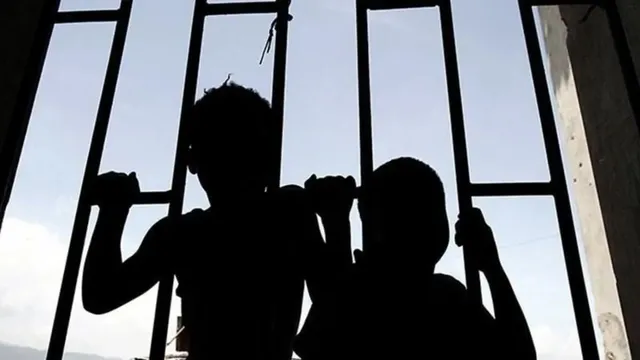- By Supratik Das
- Sun, 21 Sep 2025 01:23 PM (IST)
- Source:JND
Pakistan child abuse:More than two million children attend Pakistan's madrasas, Islamic seminaries intended to offer free Islamic schooling to poor families. But within their hallowed walls, disturbing reports of children facing physical torture, sexual exploitation, and intimidation in Pakistan’s religious seminaries have once again raised alarm, prompting a parliamentary committee to demand strong measures for protection and accountability.
The Senate Functional Committee on Human Rights, chaired by Senator Samina Mumtaz Zehri, met on Thursday to review disturbing reports of corporal punishment, sexual violence, and intimidation in religious institutions across Punjab, Sindh, and Khyber Pakhtunkhwa, Dawn reported on Friday.
How Children Suffer Inside Seminaries
Pakistan hosts over 35,000 registered seminaries where tens of thousands of children, mainly from poor families, study and live. For many families, these institutions offer free education, food, and shelter. But for countless children, the experience is marred by fear and cruelty.
Students, often separated from their families at a young age, are left under the absolute authority of clerics. This imbalance of power, combined with a lack of government oversight, has made them highly vulnerable to abuse. In most instances, clerics have impunity because of their respected position in orthodox villages. AP investigations in 2017 and 2020 revealed systemic sexual abuse across Pakistan’s religious schools, documenting hundreds of cases where children were exploited by clerics. Even if found to be guilty, a cleric is often pardoned or the matter is covered up on the order of the traditional village consultative council, where clerics have supporters and backers, Lahore-based analyst Ahsan Raza told DW.
According to reports by Dawn and earlier investigations by the Associated Press (AP), abuse takes multiple forms:
• Physical punishment: Children are hit with sticks, slapped, or forced to undergo hours of physical torture as "discipline."
• Sexual abuse: Dozens of rape and harassment cases of children by clerics have been reported, where the victims were intimidated by threats and shame. Recently, a chilling incident report has been revealed by France 24. Hassan, a 14-year-old boy from rural Punjab, recounted that he was raped by the mullah of his madrasa.
• Psychological trauma: Students are in a constant state of fear of punishment. Most are bullied into silence, told that speaking out would dishonour their families.
• Neglect: Smaller, unregistered seminaries operate without government oversight, allowing conditions where exploitation thrives unchecked.
Low accountability, Rising concern
Senator Zehri emphasised that the state's primary responsibility was to protect children, not just from poverty and neglect but also from brutality under the guise of religious or moral education. She explained that the purpose was not to defame legitimate religious seminaries but to maintain surveillance and accountability so that such schools would never become safe havens of unbridled exploitation.
The senator expressed concern over a shortage of proper registration, financial transparency, and government oversight of thousands of seminaries all over the country.
She called for the authorities to enact stringent measures, such as routine checks, parent–teacher interaction made mandatory, training of teachers on child protection, and a total prohibition on corporal punishment. Zehri also pointed to the shockingly low rates of conviction in reported cases of abuse, and cautioned that unless punishment and deterrence were apparent, the cycle of violence and exploitation would continue to prosper.
ALSO READ: Controversial Pakistani Dating Show 'Lazawal Ishq' Sparks Outrage Before YouTube Debut
Senator Aimal Wali Khan added that most of the seminaries had become cash-generating machines instead of being included within the national education system. He advocated for enacting laws to make sure that there was transparency and insisted that seminaries be brought into the mainstream education boards. The other members of the committee suggested monitoring at the district level and harmonizing provincial laws to protect vulnerable children.
As per Dawn, lawmakers at the meeting stressed that without strong prosecution and deterrence, abuse in seminaries will remain an unending cycle. The committee urged harmonised provincial laws and district-level monitoring, declaring that no child should ever suffer cruelty or exploitation under the guise of religious instruction. The child abuse within Pakistan's madrasas is not a solitary occurrence. It is a systemic failure, a callous convergence of power, religion, poverty, and silence.

